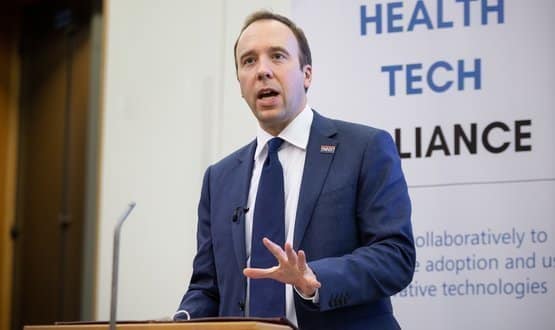Health secretary Matt Hancock has spoken of the need to up-skill the NHS workforce to prepare it for a digital-first future.
Speaking at a Parliament and Health Tech conference hosted by the Health Tech Alliance on 28 January, Hancock said there was “no excuse” for NHS organisations not to have a digital and tech leader on every board.
“And when I talk about leadership I don’t just mean people with the word ‘information’ on their name badge,” he told an audience in Westminster.
“Every CEO needs to be comfortable and competent in leading digital transformation; every board needs to know what questions to ask, how to hold their CEO to account; every medical director and chief nurse needs to know how technology is going to transform what their teams do and lead that adoption.”
Hancock warned if digital transformation was left solely to the IT department “it will fail”.
“If everyone owns it, if it’s clinically led, if the board and the CEO and the top team all have skin in the game, then, and only then, has it a chance of success,” he added.
“We need to give our people, our leaders and future leaders, our clinicians and our non-clinicians, the tools, confidence and understanding they need.”
Hancock said he had directed NHSX to ensure the Digital Ready Workforce Programme was “seriously stepped up in scope and ambition”.
A recent poll of CIOs and CCIOs, run by Digital Health, found that 59% believed top digital leadership roles should require certification.
A third of respondents (33%) said certification of CCIOs and CIOS should not be made compulsory and a further 7% answered “don’t know”.
Those in favour argued that digital is now so important to healthcare – with the potential to cause significant patient harm – that it should require trained specialist leaders.
While those against raised concerns that certification would close the profession, which is already struggling to recruit and retain skilled staff.
Members of the Digital Health Networks have also sent an open letter to NHSX chief executive Matthew Gould and NHSX deputy chief Dr Simon Eccles on the steps urgently needed to get chief clinical information officers (CCIOs) and chief information officers (CIO) appointed to NHS boards.
The NHS Long Term Plan calls for every local NHS organisation to appoint either a CCIO or CIO to their board to help accelerate digitisation efforts and ensure clinical leadership and buy-in.
The Networks, the independent communities representing NHS CCIOs and CIOs, said in a letter signed by elected chairmen James Reed and Adrian Byrne that achieving the goal would require significant new investment in current education programmes, such as the NHS Digital Academy.


2 February 2020 @ 10:15
Finally…recognition that there is a major problem in progressing digital technology when staff don’t see the need for it.
1 February 2020 @ 21:11
@ least one of (y)our NHS very senior leaders is starting to talk sense …